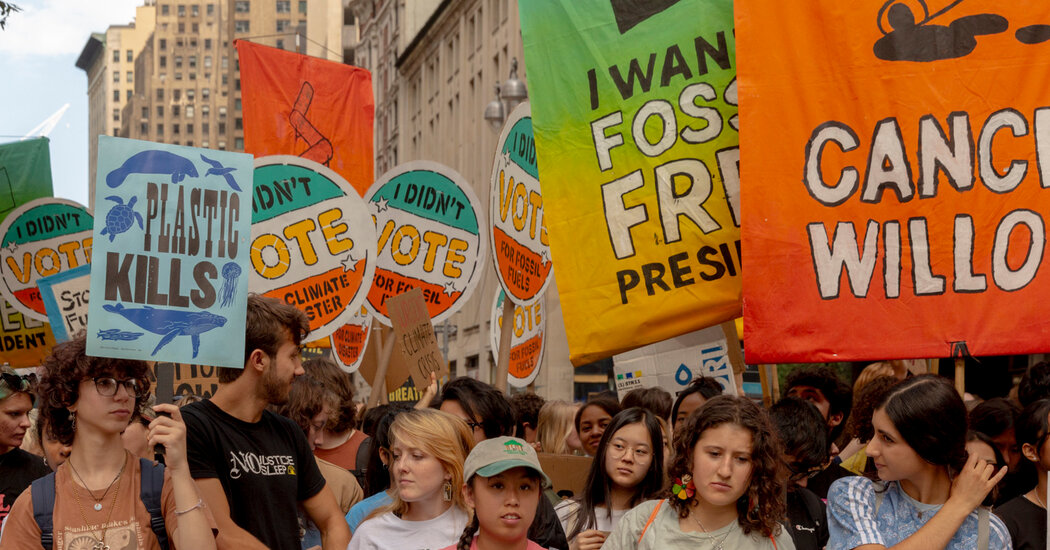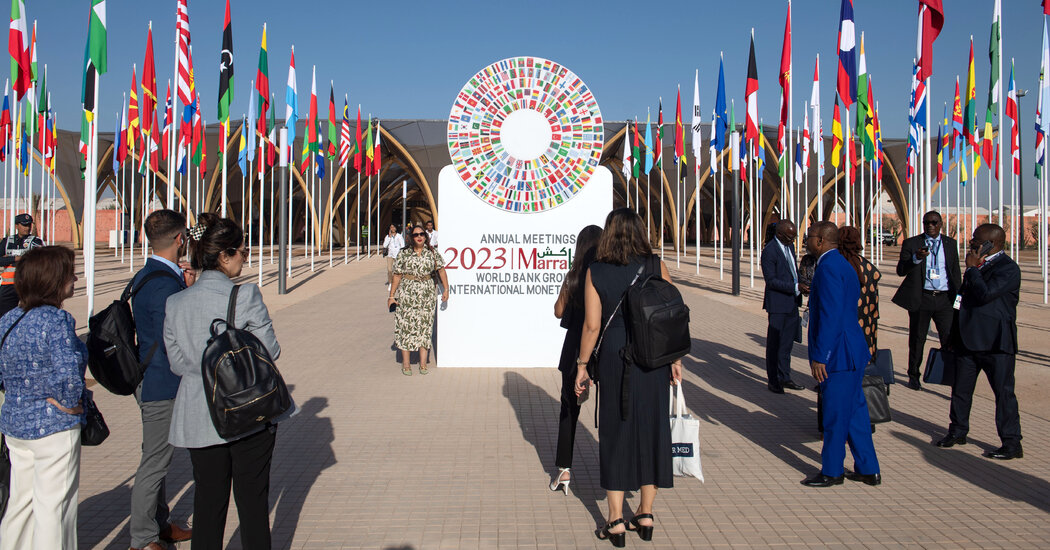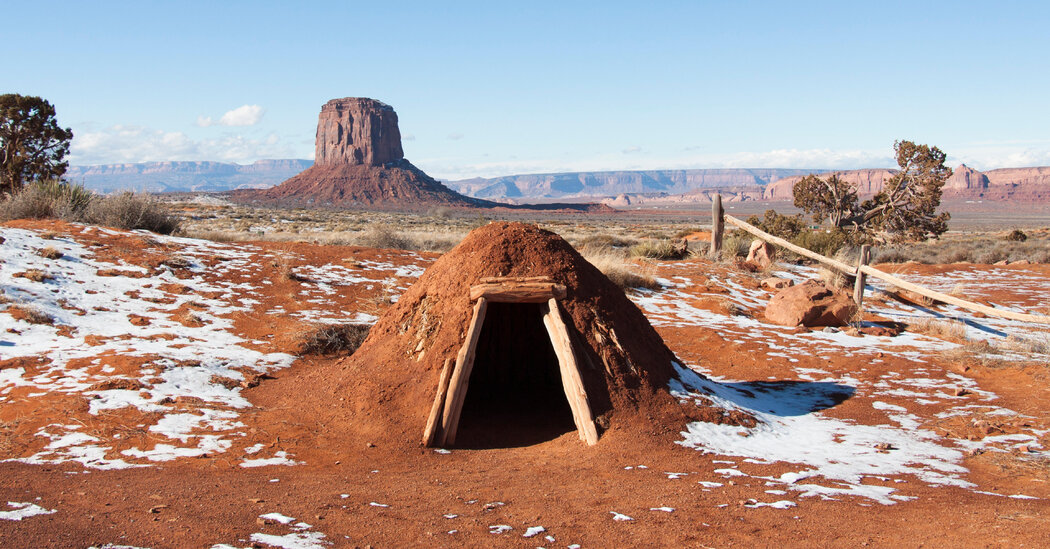Sunday in New York was as pleasant as a late summer day can be. But as tens of thousands of dancing, chanting, sign-wielding protesters took over Midtown Manhattan for the March to End Fossil Fuels, the specter of fires, floods and storms was on everyone’s mind.
Extreme weather, much of it fueled by climate change, has rattled the globe like never before. Enormous wildfires burned in Canada and Europe. Record heat seared the United States, China, Kuwait and beyond. Spiking ocean temperatures bleached corals. Deadly floods ranged from Burlington, Vt., to Derna, Libya.
Against this apocalyptic backdrop, world leaders, executives, and activists have descended on New York. More than ever, climate is at the top of the agenda.
The United Nations General Assembly began Monday, drawing hundreds of heads of state to town. A plethora of satellite events are clogging city streets, including Climate Week, the Clinton Global Initiative, a pair of Bloomberg gatherings and our own Climate Forward event on Thursday.
Many are arriving with a glint of optimism in their eyes. The rapid growth of wind and solar power, advances in electric vehicles and batteries, and growing efforts to protect nature are signs, to some, that humanity might be able to claw its way out of this crisis. But the perils of a warming planet have become impossible to ignore.
‘Profiting from destruction’
President Biden, in his speech at the U.N., cited heat waves in the U.S. and China, droughts in the Horn of Africa, and the recent flooding in Libya: “Taken together, these snapshots tell an urgent story of what awaits us if we fail to reduce our dependence on fossil fuels and begin to climate-proof our world.”
Under his administration, Biden said, “the United States has treated this crisis as the existential threat from the moment we took office, not only for us, but for all of humanity.”
Still, the United States remains a top producer and exporter of oil and gas.
António Guterres, the U.N. secretary general, who is hosting a climate summit with heads of state on Wednesday, has accused fossil fuel producers of “profiting from destruction, and has warned: “History is coming for the planet-wreckers.”
But as my colleague Somini Sengupta reports, Guterres always stops short of naming names, never singling out China, the United States, Exxon, BP or any of the world’s other biggest polluters.
“The rules of multilateral diplomacy and multilateral summitry are not fit for the speedy and effective response that we need,” Richard Gowan, a U.N. analyst for the International Crisis Group, told Somini.
‘Lagging woefully behind’
A speedy and effective response would be most welcome.
Eight years after world leaders agreed to try to limit global warming to no more than 1.5 degrees Celsius, countries have made only limited progress. That was the stark conclusion of landmark U.N. report known as the “global stocktake” that came out this month.
The report suffered from the same sort of vague condemnation that characterizes Guterres’ broadsides.
“The United Nations’ polite prose glosses over what is a truly damning report card for global climate efforts,” Ani Dasgupta, president of the World Resources Institute, told my colleague Brad Plumer. “Carbon emissions? Still climbing. Rich countries’ finance commitments? Delinquent. Adaptation support? Lagging woefully behind.”
Dasgupta’s righteous anger was shared by many of the protesters who clogged the streets of New York City on Sunday.
At the march, I talked Nalleli Cobo, a young activist from Los Angeles who grew up near an active oil well and developed cancer at age 19. She said she and her peers were fed up with the plodding pace of change and were livid with politicians who are long on promises and short on action.
“We have to remind them that we gave them the power and they’re supposed to represent us, not billion dollar corporations, not industries,” she told me.
Some of the fury at the march was directed at Sultan al-Jaber, the president of this year’s United Nations climate conference, who is also the head of the United Arab Emirates’ state oil company. Another target was Biden, who has delivered meaningful climate legislation but continues to approve some new fossil fuel projects.
“Biden, you should be scared of us,” Emma Buretta, 17, a New York City high school student and an organizer with the Fridays for Future movement, shouted at a rally ahead of the march. “If you want our vote, if you don’t want the blood of our generations to be on your hands, end fossil fuels.”
Signs of change
There is ample cause for cynicism during a week like this. Do the men and women who are purportedly here to solve the world’s great challenges really need to snack on lobster tail bites and saffron cocktails before retreating to the city’s private dining rooms?
Nevertheless, they are here making their announcements and talking on the sidelines: John Kerry, Biden’s special envoy for climate change, met with China’s vice president, Han Zheng, during the General Assembly, as the U.S. pressures Beijing, the world’s largest polluter, to do more to tackle global warming.
And if you look closely, there are signs of change.
On Friday, California sued five big oil companies, alleging decades of deception. Two days later, the state’s governor, Gavin Newsom, told me that he would be signing a state law that will require big companies to disclose their emissions, a big move that will likely set a national and international precedent.
The Biden administration, smarting from criticism of its record on climate, is gearing up to take on industrial polluters in a potential second term, my colleague Coral Davenport reports.
And amid growing calls for a more just transition plan for the global south that are often trapped in a cycle of disaster and debt, there is hope that the World Bank may be poised to deliver reforms that will make it easier for poor countries to borrow the money they need to adapt to climate change.
We’ll have more news soon for you in this jam-packed week, and will be convening a group of leaders and executives at our Climate Forward events on Thursday. We hope you’ll join us for the livestream and a Slack group.











